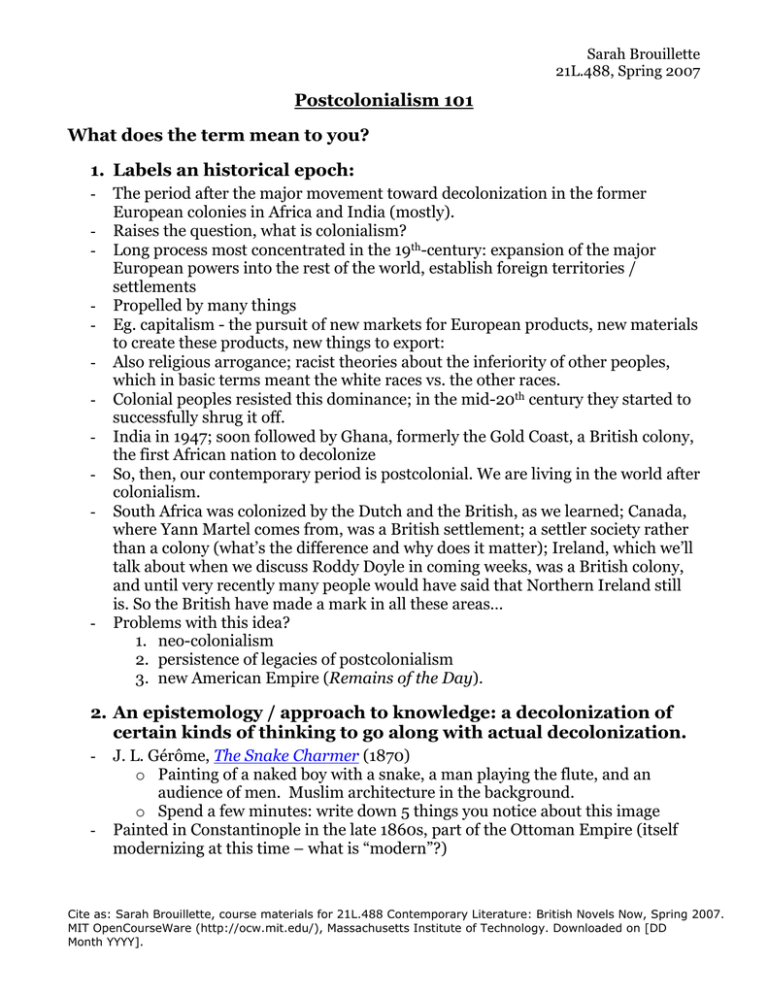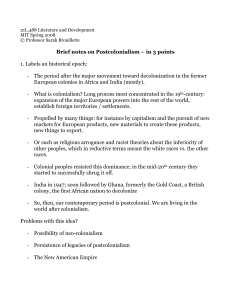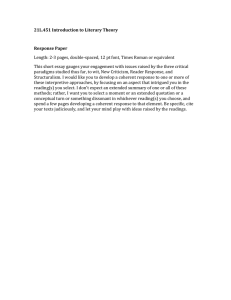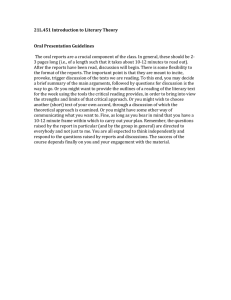Postcolonialism 101 What does the term mean to you?
advertisement

Sarah Brouillette 21L.488, Spring 2007 Postcolonialism 101 What does the term mean to you? 1. Labels an historical epoch: - - - The period after the major movement toward decolonization in the former European colonies in Africa and India (mostly). Raises the question, what is colonialism? Long process most concentrated in the 19th-century: expansion of the major European powers into the rest of the world, establish foreign territories / settlements Propelled by many things Eg. capitalism - the pursuit of new markets for European products, new materials to create these products, new things to export: Also religious arrogance; racist theories about the inferiority of other peoples, which in basic terms meant the white races vs. the other races. Colonial peoples resisted this dominance; in the mid-20th century they started to successfully shrug it off. India in 1947; soon followed by Ghana, formerly the Gold Coast, a British colony, the first African nation to decolonize So, then, our contemporary period is postcolonial. We are living in the world after colonialism. South Africa was colonized by the Dutch and the British, as we learned; Canada, where Yann Martel comes from, was a British settlement; a settler society rather than a colony (what’s the difference and why does it matter); Ireland, which we’ll talk about when we discuss Roddy Doyle in coming weeks, was a British colony, and until very recently many people would have said that Northern Ireland still is. So the British have made a mark in all these areas… Problems with this idea? 1. neo-colonialism 2. persistence of legacies of postcolonialism 3. new American Empire (Remains of the Day). 2. An epistemology / approach to knowledge: a decolonization of certain kinds of thinking to go along with actual decolonization. - - J. L. Gérôme, The Snake Charmer (1870) o Painting of a naked boy with a snake, a man playing the flute, and an audience of men. Muslim architecture in the background. o Spend a few minutes: write down 5 things you notice about this image Painted in Constantinople in the late 1860s, part of the Ottoman Empire (itself modernizing at this time – what is “modern”?) Cite as: Sarah Brouillette, course materials for 21L.488 Contemporary Literature: British Novels Now, Spring 2007. MIT OpenCourseWare (http://ocw.mit.edu/), Massachusetts Institute of Technology. Downloaded on [DD Month YYYY]. Sarah Brouillette 21L.488, Spring 2007 - - - - - - Rigid binaries: exotic vs. domestic; rational vs. irrational; science vs. religion; enlightened vs. backward; correct vs. immoral or amoral; etc. [relates to characteristics of Enlightenment modernity]. Stemming from an idea popularized by Edward Said and his book Orientalism (1978): how certain kinds of European knowledge about “the rest” of the world made actual colonial domination possible According to Said, the Occidental world, meaning the Western world, didn’t represent the reality of the East but rather the romantic notion of the "Orient.” The Middle East and Asia were viewed with prejudice and racism. They were depicted as backward and unaware of their own history and culture. Western writers and thinkers took on the task of filling this void that they themselves imagined, creating a culture, history, and future promise for them. These forms of knowledge need to be dismantled; here there is some overlap with postmodernism, as scholars have pointed out that there was no unbiased representation of the colonized parts of the world: the act of writing about those worlds was always determined by political interest and causes and by the basic socialization of the people doing the writing. Colonized peoples were doing this kind of thinking long before the actual postcolonial period, though; so in a way there were “postcolonial” ways of thinking long before actual decolonization ie. Franz Fanon, who was writing while Algeria was still under French rule So, to sum up #2, “postcolonialism” is a way of thinking about knowledge production, and how certain kinds of knowledge about other peoples can act as a prop to economic or military or physical domination. And producing alternative ideas about these colonized groups can be a very political thing. 3. A trend in literary studies. - - - After Said especially. He was writing from a position within the Western academy. And writing not about “native” forms of knowledge produced by colonized people, but about the Western canon of literary texts and how it produced knowledge about the “other” parts of the world. So the inequalities of colonialism carry on as a kind of arrangement of the production of knowledge. The nexus for the production of deconstructing or countering discourses that challenge the dominance of colonialist thought or practice is the WEST. This is an especially sore point for Marxists, who said hey wait a minute, colonialism didn’t happen because of certain ideas that Europeans had about the rest of the world; colonialism happened because people in the West had more military might and more money and could therefore impose themselves on others more successfully. It isn’t ideas that make the world turn, it is economics. Cite as: Sarah Brouillette, course materials for 21L.488 Contemporary Literature: British Novels Now, Spring 2007. MIT OpenCourseWare (http://ocw.mit.edu/), Massachusetts Institute of Technology. Downloaded on [DD Month YYYY]. Sarah Brouillette 21L.488, Spring 2007 - - So, in this definition of postcolonialism, it is a movement in the Western academy, something that happens after a bunch of people from formerly colonized nations move to the West and start writing about colonialism, and start talking about Western canonical texts that propped up colonialism and eventually start talking about and teaching texts written mostly by other third world migrants to the first world, and sometimes by writers who continue to live in the third world. 4. A certain kind of literature; a “brand” – the reader will have certain expectations about before reading. - at first writers who were considered postcolonial wouldn’t be writing with the knowledge that there was such a category Salman Rushdie’s Midnight Children and Bharati Mukherjee’s Jasmine now there are expected tropes and themes that these books will return to, and there is a niche within the publishing industry for just this kind of writing. Products tagged “postcolonial fiction” on amazon.com What are the characteristics of this literature? We’ll find out, but here are a few things: o Challenging binaries; championing hybridity and border-crossing of human identities o often about migrancy (the post-colonialism influx of formerly colonized peoples into the one-time colonial metropolitan centers) o often uses strategies from postmodernism to achieve its ends o But we’ll talk much more about this in future weeks Cite as: Sarah Brouillette, course materials for 21L.488 Contemporary Literature: British Novels Now, Spring 2007. MIT OpenCourseWare (http://ocw.mit.edu/), Massachusetts Institute of Technology. Downloaded on [DD Month YYYY].





